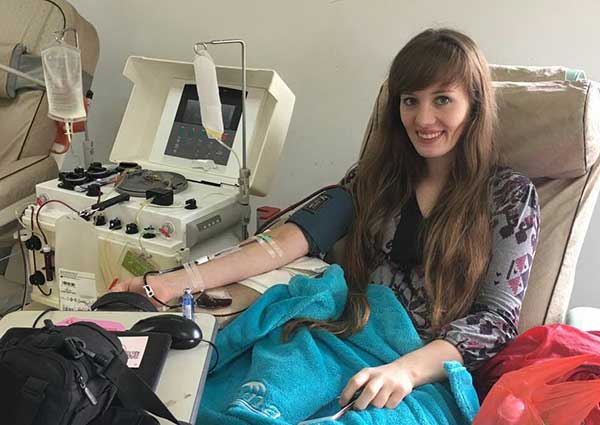


German girl Christa Maria Idel donates her Rh-negative blood to save a 75-year-old woman in Wenzhou, Zhejiang province, on Tuesday. [Photo/China Daily]
A 21-year-old German girl recently donated her "panda blood", or Rh-negative blood, on two occasions to save a 75-year-old woman in Wenzhou, Zhejiang province.
Christa Maria Idel, a language student at Zhejiang University, came to China to study for one semester, adopting the Chinese name Gao Xiongmao.
When she found out that her blood type is Rh-negative, she called herself Xiongmao, the Chinese name for panda.
She is 1.75 meters tall, so she surnamed herself Gao, which means tall in Chinese.
"I was told that only 0.3 percent of the population in China have 'panda blood'. The proportion in some Western countries is as high as 6 percent or higher. This was news to me," she said.
Out of curiosity, Gao searched on Weibo to find out more information about the blood type.
She found a post asking for help from the family of an old woman who suffers from aplastic anemia and fainted in October.
She left a message on the post and a doctor contacted her a couple of days later.
The old woman, Kong Qinmei, has merely one-fiftieth of the normal platelet level and requires blood transfusions to keep her alive.
There are 4,000 "panda blood" carriers registered at the provincial blood center, but only tens of carriers are in Wenzhou and can be contacted, and the hospital was unable to find enough blood for one transfusion.
Gao decided to help Kong.
In the middle of last month, Gao skipped class and took a high-speed train to Wenzhou, a southern city she had never heard of about four hours from Hangzhou, the capital of Zhejiang province.
"I met the family. They said 'thank you' to me many times, but I don't think it is a big deal," she said.
Born in Krefeld, Germany, Gao studied at the University of Goettingen, majoring in Chinese and sports. She had been learning Chinese for two years and came to Zhejiang University as an exchange student to improve her Chinese ability.
"My father is a doctor and always tells me to help those in need. On the train back to the university, I felt great happiness," she said.
However, after finding out on the weekend that Kong had failed to find enough donors for her latest transfusion, Gao went to Wenzhou on Tuesday and volunteered to donate her blood again, without hesitation.
"I feel that I have a special connection with Wenzhou and the family now," she said.
 Fire brigade in Shanghai holds group wedding
Fire brigade in Shanghai holds group wedding Tourists enjoy ice sculptures in Datan Town, north China
Tourists enjoy ice sculptures in Datan Town, north China Sunset scenery of Dayan Pagoda in Xi'an
Sunset scenery of Dayan Pagoda in Xi'an Tourists have fun at scenic spot in Nanlong Town, NW China
Tourists have fun at scenic spot in Nanlong Town, NW China Harbin attracts tourists by making best use of ice in winter
Harbin attracts tourists by making best use of ice in winter In pics: FIS Alpine Ski Women's World Cup Slalom
In pics: FIS Alpine Ski Women's World Cup Slalom Black-necked cranes rest at reservoir in Lhunzhub County, Lhasa
Black-necked cranes rest at reservoir in Lhunzhub County, Lhasa China's FAST telescope will be available to foreign scientists in April
China's FAST telescope will be available to foreign scientists in April "She power" plays indispensable role in poverty alleviation
"She power" plays indispensable role in poverty alleviation Top 10 world news events of People's Daily in 2020
Top 10 world news events of People's Daily in 2020 Top 10 China news events of People's Daily in 2020
Top 10 China news events of People's Daily in 2020 Top 10 media buzzwords of 2020
Top 10 media buzzwords of 2020 Year-ender:10 major tourism stories of 2020
Year-ender:10 major tourism stories of 2020 No interference in Venezuelan issues
No interference in Venezuelan issues
 Biz prepares for trade spat
Biz prepares for trade spat
 Broadcasting Continent
Broadcasting Continent Australia wins Chinese CEOs as US loses
Australia wins Chinese CEOs as US loses